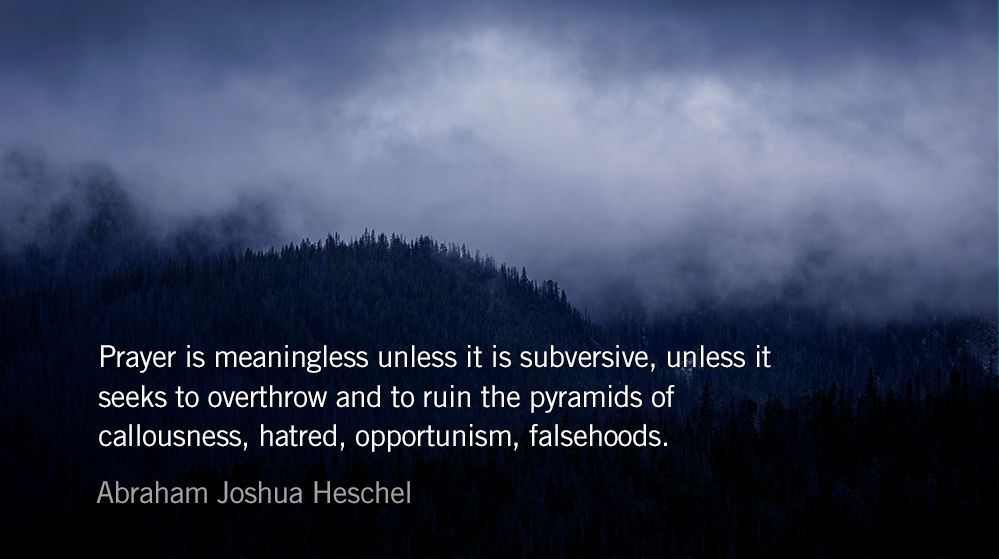Prayer is an invitation to unite one’s soul with limitless power, infinite grace, and radical sovereignty. Yet, in the face of everything going on in our world, the call to prayer seems like a passive and feckless response—a cheap excuse to skip out on the hard work of engaging and making a difference.
The residue of modernism continues to reject the reality of transcendence. In other words, our key problem is not about the substance of prayer, but about our orientation to a life of prayer. “When I marched in Selma, I felt my legs were praying,” reflected Abraham Joshua Heschel. The rabbi walked arm-in-arm with Dr. Martin Luther King—to these men, prayer was action.
In Moral Grandeur and Spiritual Audacity Rabbi Heschel explains:
Prayer must never be a citadel for selfish concerns, but rather a place for deepening concern over other people’s plight. Prayer is a privilege. Unless we learn how to be worthy, we forfeit the right to prayer.
Prayer is meaningless unless it is subversive, unless it seeks to overthrow and to ruin the pyramids of callousness, hatred, opportunism, falsehoods. The liturgical movement must become a revolutionary movement, seeking to overthrow the forces that continue to destroy the promise, the hope, the vision.
The world is aflame with evil and atrocity; the scandal of perpetual desecration of the world cries to high heaven. And we, coming face to face with it, are either involved as callous participants or, at best, remain indifferent onlookers.
The relentless pursuit of our interest makes us oblivious of reality itself. Nothing we experience has value in self; nothing counts unless it can be turned to our advantage, into a means of reserving our self-interests.
Dark is the world to me, for all its cities and stars. If not for my faith that God in His silence still listens to a cry, who could stand such agony?
Prayer will not come by default. It requires education, training, reflection, contemplation. It is not enough to join others; it is necessary to build a sanctuary within, brick by brick, instants of meditation, moments of devotion. this is particularly true in an age when overwhelming forces seem to conspire at destroying our ability to pray.
Every action of grace, justice, and restoration is built on the foundation of prayer. In I Asked for Wonder Heschel concludes, “To pray means to bring God back into the world, to establish His sovereignty for a second at least. God is transcendent, but our worship makes God immanent. To pray means to expand God’s presence.”
Reading List
- This is Not The Day to Retreat. Rabbi Laura Janner-Klausner for Jewish News Online.
- A Prayer Life That Nourishes Your Relationship to God. Timothy Keller for Redeemer Presbyterian Church.
- Spirituality of Letting Go. Richard Rohr for The Center for Action and Contemplation.
- Ever Ancient, Ever New: The Art and Practice of Lectio Divina. United States Council of Catholic Bishops.
Today’s Reading
Joel 3 (Listen – 3:20)
Psalms 143 (Listen – 1:34)
This Weekend’s Readings
Amos 1 (Listen – 2:38) Psalms 144 (Listen – 1:56)
Amos 2 (Listen – 2:12) Psalms 145 (Listen – 2:19)






